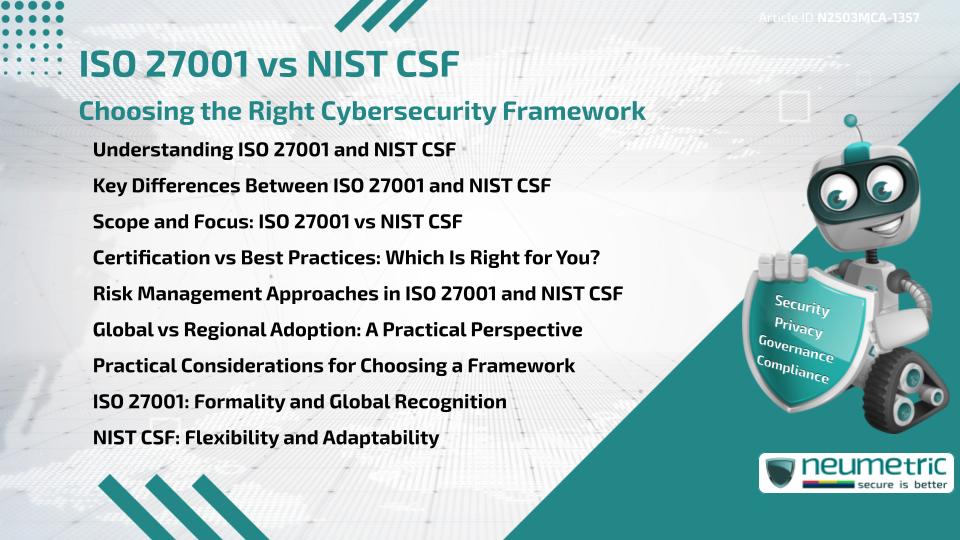Cybersecurity is more critical than ever & businesses need a structured approach to Safeguard Sensitive Data. Two leading Cybersecurity Frameworks—ISO 27001 & the NIST Cybersecurity Framework [CSF]—offer distinct approaches to achieving robust security. But how do you decide which one to choose for your organization? In this article, we will dive into a detailed comparison of ISO 27001 vs NIST CSF, discussing their history, practical applications & key differences. We will also weigh the pros & cons to help you make an informed decision.
Table of Contents
ToggleUnderstanding ISO 27001 & NIST CSF
Before comparing the two frameworks, it is important to understand what each represents.
ISO 27001: A Global Standard for Information Security
ISO 27001 is an International standard for Managing Information Security. Developed by the International Organization for Standardization (ISO), this framework focuses on protecting sensitive data through an Information Security Management System [ISMS]. ISO 27001 sets out the criteria for establishing, implementing, maintaining, & improving an ISMS within the context of the organisation’s overall business risks.
NIST CSF: A Comprehensive Framework for Cybersecurity
The National Institute of Standards & Technology [NIST] developed the Cybersecurity Framework [CSF] in response to increasing Cybersecurity threats in the U.S. NIST CSF is a flexible framework that helps organizations manage & mitigate Cybersecurity Risks. It consists of five (5) key functions: Identify, Protect, Detect, Respond & Recover. NIST CSF is widely used by U.S. companies, but its adoption has spread internationally as well due to its adaptable nature.
Key Differences Between ISO 27001 & NIST CSF
Scope & Focus
One of the primary distinctions between ISO 27001 vs NIST CSF is their scope.
- ISO 27001 focuses heavily on managing Information Security in a structured, formalized manner. It requires Certification, which means your organisation will undergo an Audit to ensure Compliance.
- NIST CSF, on the other hand, is more flexible & focused on providing Best practices & Guidelines rather than mandating specific requirements. It is designed to be adaptable for organisations of all sizes & sectors.
Approach to Risk Management
Both Frameworks prioritize Risk Management, but their approaches differ.
- ISO 27001 takes a more formal, process-driven approach to Risk Management. It provides a clear structure for Identifying Risks, Assessing them & Implementing controls to mitigate them.
- NIST CSF allows for greater flexibility, encouraging organisations to tailor their Risk Management practices to their specific needs. It provides a High-level roadmap for improving Cybersecurity practices without being overly prescriptive.
Certification vs. Best Practices
A key practical difference between ISO 27001 vs NIST CSF is the Certification process.
- ISO 27001 requires a Formal Audit & Certification process. This can be a significant investment of time & resources, but it provides a clear benchmark for your organisation’s Cybersecurity efforts.
- NIST CSF, however, does not have a Certification process. It is focused on guiding organisations to improve their Security posture & Implement controls at their own pace. This makes it a more flexible option but may not carry the same level of industry recognition as ISO 27001 Certification.
Global vs. Regional Adoption
- ISO 27001 is recognized internationally as the Gold standard for Information Security. Its global adoption makes it a great choice for businesses operating across borders.
- NIST CSF, while gaining International traction, was initially developed for U.S.-based organisations. As such, it is often seen as more relevant for companies in the U.S. or those with U.S.-based clients.
Practical Considerations for Choosing the Right Framework
When deciding between ISO 27001 vs NIST CSF, there are several practical factors to consider.
Industry Requirements
If you operate in an industry with Strict Regulatory requirements—such as Finance or Healthcare—ISO 27001 may be the better choice due to its formal structure & Global Recognition. Additionally, some clients may require ISO 27001 Certification as a condition for doing business.
Organisational Flexibility
If your organisation requires a more adaptable approach, NIST CSF might be more suitable. Its flexible framework allows you to scale your Cybersecurity practices according to your organisation’s size, Risk Appetite & available resources.
Resources & Budget
ISO 27001’s Certification process can be resource-intensive. The Cost of Audits, Training & Internal resources needed for ongoing Compliance can add up. If your organisation is smaller or has limited Cybersecurity resources, NIST CSF might offer a more Cost-effective approach.
Future Expansion
If you plan to expand internationally, ISO 27001 could help streamline Compliance efforts. It is a globally recognized Standard, which could ease the process of expanding into new markets.
Conclusion
Choosing between ISO 27001 vs NIST CSF ultimately depends on your organisation’s needs, industry requirements & available resources. ISO 27001 is ideal for businesses seeking formal Certification & a globally recognized standard, while NIST CSF offers a more flexible approach that can be tailored to your organisation’s specific requirements.
Takeaways
- ISO 27001 is a formal, internationally recognized Certification Standard for Information Security management, ideal for businesses looking for a structured, Audit-driven approach.
- NIST CSF is a flexible framework providing guidelines for managing Cybersecurity Risks, suitable for organisations looking for an adaptable, Non-Certification-based approach.
- Consider your industry, resources & expansion plans when deciding between the two frameworks.
FAQ
What is the main difference between ISO 27001 & NIST CSF?
ISO 27001 is a formal standard that requires Certification, while NIST CSF is a flexible framework without a Certification process, focusing on providing guidelines rather than strict requirements.
Can a Company use both ISO 27001 & NIST CSF?
Yes, many organisations use both frameworks. ISO 27001 can be used for formal Certification, while NIST CSF can guide Risk Management & Cybersecurity improvement efforts.
Is ISO 27001 more expensive than NIST CSF?
ISO 27001 can be more expensive due to the Certification process, including Audits & ongoing Compliance efforts. NIST CSF, by comparison, does not require Certification & can be more cost-effective.
Which framework is better for small businesses?
NIST CSF may be more suitable for small businesses due to its flexible & less resource-intensive nature, while ISO 27001 is more formal & may require more resources to maintain Certification.





